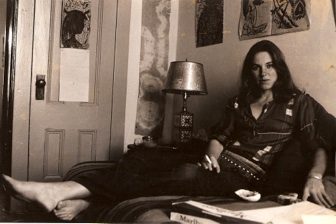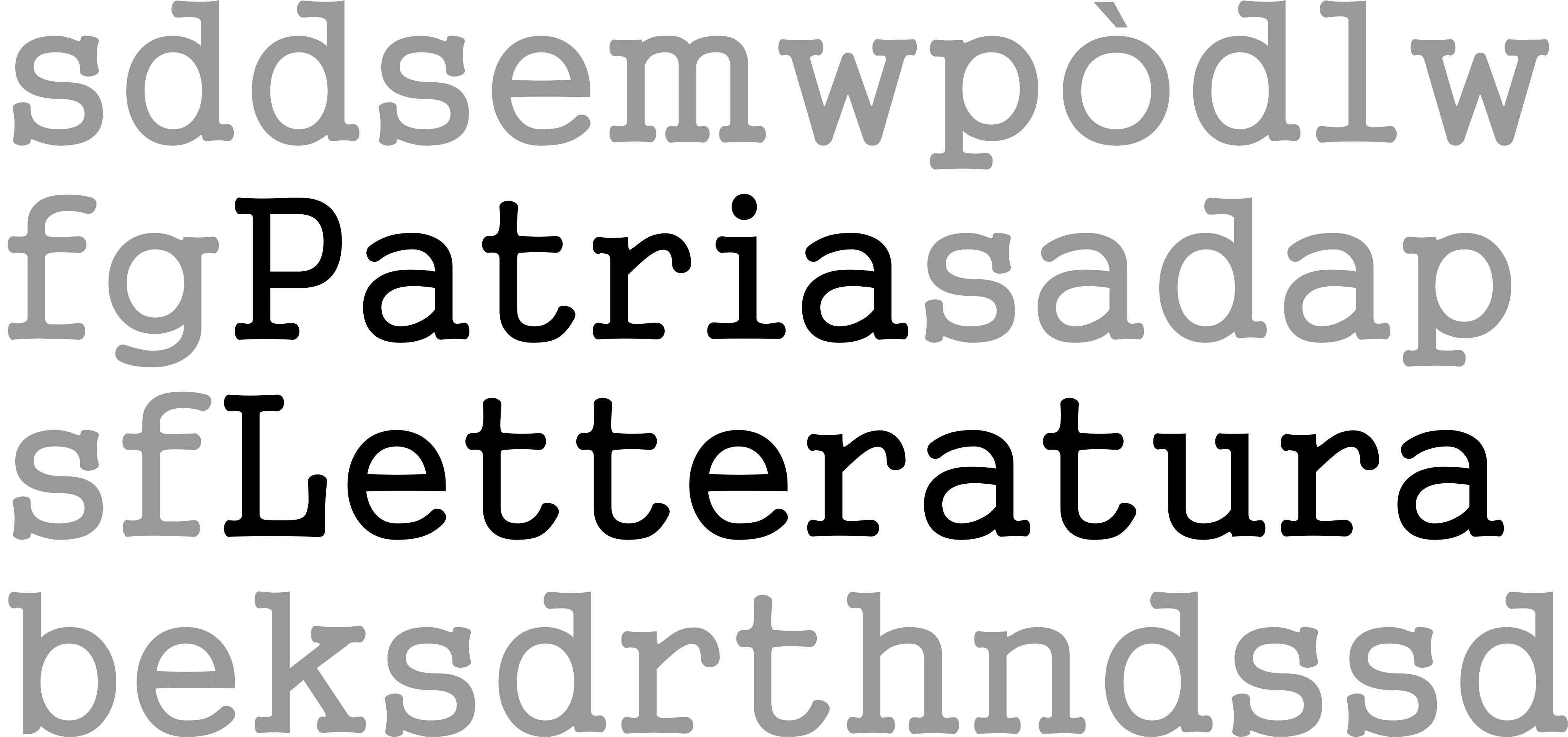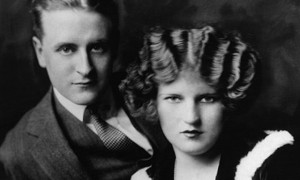
Due poesie inedite di Kaye McDonough # traduzione di Alessandra Bava
“Dialogo sulle aspre critiche a Zelda Sayre Fitzgerald” e “Sono diventata folle per amore, amore, folle” sono due poesie inedite di Kaye McDonough tradotte da Alessandra Bava.
Dialogo sulle aspre critiche a Zelda Sayre Fitzgerald di Kaye McDonough
“Mi piacevano le case in costruzione e spesso camminavo
sui tetti. Mi piaceva saltare da luoghi elevati… mi piaceva
tuffarmi e arrampicarmi tra le cime degli alberi…”
Zelda S. Fitzgerald
I.
Nel Sud dalle stanze bianche e giovani che brindano alla castità
accanto al pero e davanti al giudice disse:
L’aria brilla ed è al contempo gialla e bianca.
Questa è l’aria regalo e il giorno che la trattiene
Desidero [desideravo] infondere luminosità alla vita, ravvivarla come una fiamma
Desidero, [desideravo] tutto, sai.
Ha spinto la scale ed è piombata sul palcoscenico
II.
“Ho visitato Scott Fitz e sua moglie
quest’ultima una volubile bellezza del Sud
di provincia. Mastica gomme – mostra le ginocchia”
— A. McKaig, Diari
Così stupì Montgomery, Alabama
(le province si stupiscono così facilmente)
Così Ring Lardner le dedicò una poesia
(non uno dei suoi esiti migliori)
Così dipingeva
(forme grottesche, deturpate… che fecero bene a conservare in cantina)
e ballava
(goffamente… in modo pessimo… era solo una volgare esibizionista)
e scriveva
(in modo imbarazzante… leziosità pura… non avrebbe mai pubblicato
nulla se non per il cognome del marito al seguito)
Così ebbe una bambina
(e non fu granché come madre a sentire i resoconti)
un marito
(ubriachi entrambi, davvero, ma lui di gran lunga più di lei… melodrammi esagerati)
un amante
(oh sì, l’aviatore… si considerava “una pioniera”)
un sogno
(osservate da vicino quelle… sciocchezze romantiche… narcisismo autodistruttivo,
se volete la mia opinione… non il sogno di una mente)
Dunque era alla pari con i migliori tra loro
(se si può chiamare chiunque a quell’epoca di prim’ordine ad eccezione di Edmund Wilson e anche lui era impegnato a rendersi ridicolo con Edna St. Vincent Millay, un altro caso)
e poi la migliore tra loro
Bene, bene, allora, allora cosa?
Spuntate Dos Passos, Rebecca West
gli artisti, i critici, gli psichiatri
sapete, le autorità
Era mediocre e a dir poco nevrotica,
malata – puoi chiudere il becco Zelda
Fate chiudere il becco a quella donna
Com’è potuta diventare chi è diventata?
Quella novellina – Fermate il suo corso
Non era Non faceva Non poteva
No. Diciamocelo, tutto ciò che aveva era una faccia tosta.
Eppure faceva voltare i circoli,
eccentrico il modo in cui lo faceva, disse la perspicace Sara
Sì, strano il modo in cui volteggiava
pressoché asessuata, pressoché ignara
della stanza intenta a verificare il suo equilibrio
Che ballo era?
III.
Come se lo spirito potesse parlare solo la lingua
resa intellegibile dalla morte, faccio appello a voi dal fondo della rovina
con parole che penso riconoscerete:
Mentre i gambi di granturco sollevavano le cime seriche alla luna
il sogno del Montana scivolava dal limitare delle pianure sino alla loro fine
la visione assicurata alla fune, costretta a guardarsi
niente affatto bella, niente affatto.
Più animali domestici e avidità
non era il cantare a cui mancava qualcosa
non era la canzone dalla profondità del sogno
ricominciando dai piatti
e “diamogli un’occhiata” ed “eccolo qui”
l’ordinario immutato
Vi aspettate che io approvi questo sminuimento
Vi aspettate che me ne stia seduta come una brava ragazza
gorgheggiando il pisolino sul tappeto, il cassiere in banca
dicendo urrà a questo inebetimento
che il vento venga strappato alla tempesta
lo stregone esiliato dalla sua tinozza
che ogni giorno non accada nulla
che gli occhi siano puntati sul Cemento Duco e ciò che accade nel bagno
e su di me che faccio la ruota lungo strade di magnolia?
Cantate questa patata che chiamate realtà
se potete, se riuscite davvero
e provate gratitudine poiché sapete che non state
morendo di un appetito moribondo
Zelda, Zelda, Zelda. Qui, qui. Ancora, ancora.
Facciamola tacere.
Aveva solo il cuore infranto per qualcosa
che la terapia avrebbe potuto risolvere,
o un brav’uomo o un’istruzione
se solo qualcuno le avesse detto
la Repubblica ha ciò che ha sempre voluto:
la delibera ufficiale che tutto è OK
qual è il suo problema in ogni caso?
Se ogni cosa vasta è racchiusa, definita
se il caso di una vita è svelato, il mistero risolto
se il mio verso è così ordinato e classificato che è derubato di tutto ciò di raro che esso contiene
se anche la brutale magia della mia testa è proprietà istituzionale
allora sputo ancora sul vostro ordinario
allora sputo ancora sulla vostra normalità
allora sputo ancora sugli epiteti che date ad ogni cosa
poiché sono giunta sul baratro e sono caduta
e credo nella promessa dell’aria.
Oh e di cosa parla adesso?
È diventata proprio una lagna, non è vero? Davvero.
I vostri epiteti sono scuse per aver smesso di sognare
I vostri epiteti sono idoli per proteggervi dall’incertezza
Voi che avete paura di sentire e paura di sbagliare
paura di dare una forma ai vostri sogni
Vi chiamo codardi e ai miei amici dico
Non temete i guardiani della percezione
Beh la semplice verità è che non aveva amici
povera donna. Piena di illusioni.
Il talento cui aspirava – un vero disastro.
Meglio orticaria ed eczema.
Beveva troppo
Divenne grassa, divenne pazza
Parve brutta un giorno – così riferì Hemingway
Ebbe troppi postumi da sbronze,
non ebbe, beh lo sapete, non ce la fece
ma nei libri, nei libri polverosi ho notato
sulla pagina senza vita, lì tra la litania dei cadaveri,
una cosa che potrebbe essere passata inosservata:
una donna viva, reale prese fuoco
a mezzanotte del 1° marzo 1948, non è così?
Dialogue on the Panning of Zelda Sayre Fitzgerald di Kaye McDonough
“I liked houses under construction and often I walked on open roofs. I liked to jump from high places… I liked to dive and climb in the tops of tree…”
–Zelda S. Fitzgerald
I.
In the South of white rooms and young men toasting chastity
Beside the pear tree and in front of the judge she said:
The air shines and it is yellow and white at the same time.
This is the gift air and the day holding round it
I want [I wanted] to blow into life a brilliance as into a flame to fan it
I want [I wanted] you know, everything.
She kicked away the ladder and fell down on stage
II.
“Called on Scott Fitz and his bride
Latter temperamental small town
Southern belle. Chews gum – shows knees”
— A. McKaig, Diaries
So she amazed Montgomery, Alabama
(the provinces are easily amazed)
So Ring Lardner wrote her a poem
(not one of his best efforts)
So she painted
(grotesque, disfigured shapes… they did well to keep them in the basement)
And danced
(awkwardly… appallingly second rate… she was just a vulgar exhibitionist
And wrote
(embarrassing… pure sentimentality… would never have had a thing published without her husband’s name behind her)
So she had a child
(and wasn’t much of a mother, to hear the reports)
A husband
(drunks, really, the two of them – but he much her better… overblown melodrama)
A lover
(Oh , yes, the aviator… fancied herself a ‘pioneer’)
A dream…
(take a close look at that romantic drivel… self-destructive narcissism if
you want my opinion… not the dream of an intelligence)
So she held her own the best of them
(if you can call anyone from that era who was really first rate other than Edmund Wilson and he was too busy making a fool of himself over Edna St. Vincent Millay, another case)
And then the best of those
Well, well, so, so what?
Check Dos Passos, Rebecca West
The artists, the critics, the psychiatrists
You know, the authorities
She was mediocre and, to say the least, neurotic
Sick – and you can shut up Zelda
Shut that woman up
How could she have been who she was?
That raw girl – Stop her movement
Wasn’t didn’t couldn’t
No. All she ever had was, let’s face it, nerve
Yet she turned circles
Odd her way with it, rational Sara said
Yes, strange the way she turned
Nearly sexless, nearly oblivious
The room transfixed to check her balance
What was that dance?
III.
As if the spirit could speak only in the language
Made intelligible by death, I call to you from the ends of ruin
In words I think you’ll recognize:
While cornstalks raised silken heads to the moon
The Montana dream slid to the edge of the plains to its ending
The vision roped down, made to look at itself
No lovely, not lovely at all.
More domestic animals and greed
Not the singing that was wanting
Not the song from deep in the dream
Back to the pots and pans
And ‘Let’s look at it’ and ‘Here it is’
The ordinary untransformed
You expect me to bravo this shrinking
You expect me to sit down like a good girl
Yodel the nap of the carpet, the teller at the bank
Hurrah this stupor
That the wind has been taken out of the storm
The sorcerer exiled from his vat
That every day, every day, nothing can happen
That sights are set on Duco Cement and what happened in the bathroom?
Me from cartwheeling magnolia streets?
You sing about this potato you call reality
If you can, if you honestly can
And feel grateful that you aren’t
You know, starving from a deadened appetite.
Zelda, Zelda, Zelda. Here, here. Now, now.
Let’s do quiet her
She was just broken-hearted over something
Therapy could have fixed
Or a good man or an education
If only someone had told her
The Republic has what it’s always wanted:
Official sanction that everything’s OK.
What was the matter with her anyway?
If everything vast is encompassed, defined
If the life case is cracked, the mystery solved
If my line is so ordered and classified it’s robbed of all that was rare in it
If even the brutal magic of my head is institutional property
I still spit on your ordinary
I still spit on your normal
I still spit on the names you give to everything
Because I’ve been to the edge and fallen off
and I believe in the promise of air
Oh, what is she talking about now?
Really. She’s become quite a bore, hasn’t she?
Your names are excuses for failing to dream
Your names are idols to protect you from uncertainty
You who are afraid to feel, afraid to fail
Afraid to give your thoughts a shape
I call you cowards, and to my friends I say
Take heart against the wardens of perception
Well, the simple truth is she had no friends
Poor woman. Filled with self delusions
That brilliance she wanted – a total disaster
Hives and eczema are more like it
She drank too much
Got far, got crazy
Looked ugly one day — Hemingway said so
Had too many hangovers
Didn’t have, well, you know, just didn’t make it
But I did notice in the books, in the dusty books
On the dead page, there among the litany of corpses
One fact that may have been overlooked:
A real, live woman went up in flames
Midnight, March 10, 1948, wasn’t it?
Sono diventata folle per amore, amore, folle di Kaye McDonough
Le tue storie mi hanno riempita come una stanza
sono inciampata sui tuoi nonni
caduta su un cugino, una moglie
Le tue sconfitte mi colpiscono alla testa
Mi feriscono con il ricordo
Ieri ho visto il ragazzo che devi essere stato
seduto tranquillo con le mani posate
sul tavolo della cucina
Oggi ti vedo attraversare ogni strada
ma vado in giro da sola, amore
cercando i miei sentimenti in librerie
mezze ebbre, sotto una mezzaluna
che pende sopra il mio giorno come un cuore
I Have Gone Mad With Love, Love, Mad di Kaye McDonough
Your stories have filled me up like a room
I trip over your grandparents
fall against a cousin, a wife
Your losses hit me on the head
hurt me with remembering
Yesterday, I saw the boy you must have been
sitting quietly with his hands folded
at the kitchen table
Today, I see you crossing every street
but I walk around alone, love
Looking up my feelings in bookstores
Half drunk, under a half eaten moon
That hangs across my day like a heart
Kaye McDonough, classe 1943, è una scrittrice e poetessa americana. Nata a Pittsburgh, si iscrive al Vassar College, alla Boston University e alla University of California a Berkeley, dove studia letteratura e storia dell’arte. Nel 1963 si trasferisce a Parigi dove completa i suoi studi alla Sorbona e segue le orme degli scrittori della “generazione perduta”. Tornata in California diventa parte della scena Beat di seconda generazione a San Francisco, come giovane editrice della Green Light Press e come poetessa declamando in modo teatrale le sue poesie nei vari reading, in modo particolare quelle dedicate a Zelda Fitzgerald. Nel 1978 City Lights Books pubblicherà il suo testo teatrale Zelda, che ebbe grande eco ed è andato in scena nei teatri di Off-Broadway. Negli anni Ottanta ha sposato il poeta Gregory Corso dal quale ha avuto un figlio. Negli anni Novanta ha lasciato San Francisco per trasferirsi sulla East Coast dove risiede attualmente.
IN COPERTINA: “Kaye McDonough” © Mark Green

